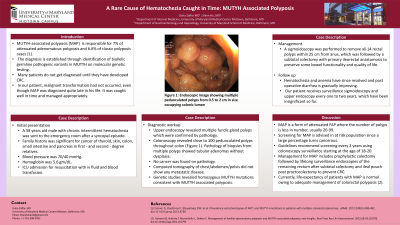Tuesday Poster Session
Category: GI Bleeding
P3484 - A Rare Cause of Hematochezia Caught in Time: MUTYH-Associated Polyposis
Tuesday, October 24, 2023
10:30 AM - 4:00 PM PT
Location: Exhibit Hall

Has Audio

Duha Zaffar, MBBS, MD
University of Maryland Medical Center Midtown Campus
Baltimore, MD
Presenting Author(s)
Duha Zaffar, MBBS, MD1, Shien Hu, MD2
1University of Maryland Medical Center Midtown Campus, Baltimore, MD; 2University of Maryland School of Medicine, Baltimore, MD
Introduction: MUTYH-associated polyposis (MAP) is an autosomal recessive syndrome associated with colorectal adenomas, with an increased risk of colorectal cancer (CRC). The diagnosis is established through identification of biallelic germline pathogenic variants in MUTYH on molecular genetic testing. Many patients do not get diagnosed until they have developed CRC. In our patient, malignant transformation had not occurred, even though MAP was diagnosed quite late in his life. It was caught well in time and managed appropriately.
Case Description/Methods: A 58 years old male with history of chronic, intermittent, hematochezia was sent to the emergency room after a syncopal episode. Family history was significant for cancer of thyroid, skin, colon, small intestine and pancreas in first - and second - degree relatives. Blood pressure was 70/40 mmHg. Hemoglobin was 5.6 gm/dL. Upper endoscopy and colonoscopy revealed multiple gastric fundal polyps and more than 50 polyps throughout colon. Pathology revealed fundic gland polyp and tubular adenomas respectively. Malignant changes were not seen on biopsy. Computed tomography of chest/abdomen did not show any metastatic disease. Genetic studies revealed homozygous MUTYH mutations consistent with MUTYH associated polyposis. Multi step management was executed. First, with the help of sigmoidoscopy, all rectosigmoid polyps were removed so as to preserve some bowel functionality by keeping the rectum. This was followed by subtotal colectomy with primary anastomosis. Hematochezia has since resolved and post operative diarrhea is gradually improving. Our patient receives regular surveillance sigmoidoscopy and upper endoscopy which have been insignificant so far.
Discussion: Management for MAP includes prophylactic colectomy followed by lifelong surveillance endoscopies of the remaining rectum after subtotal colectomy and ileal pouch post proctocolectomy to prevent CRC. There is no consensus on the correct type and timing for colectomy, however patients prefer subtotal colectomy given a better quality of life. Currently, life-expectancy of patients with MAP is normal owing to adequate management of colorectal polyposis¹.
¹ Aelvoet AS, Buttitta F, Ricciardiello L, Dekker E. Management of familial adenomatous polyposis and MUTYH-associated polyposis; new insights. Best Pract Res Clin Gastroenterol. 2022;58-59:101793. doi:10.1016/j.bpg.2022.101793

Disclosures:
Duha Zaffar, MBBS, MD1, Shien Hu, MD2. P3484 - A Rare Cause of Hematochezia Caught in Time: MUTYH-Associated Polyposis, ACG 2023 Annual Scientific Meeting Abstracts. Vancouver, BC, Canada: American College of Gastroenterology.
1University of Maryland Medical Center Midtown Campus, Baltimore, MD; 2University of Maryland School of Medicine, Baltimore, MD
Introduction: MUTYH-associated polyposis (MAP) is an autosomal recessive syndrome associated with colorectal adenomas, with an increased risk of colorectal cancer (CRC). The diagnosis is established through identification of biallelic germline pathogenic variants in MUTYH on molecular genetic testing. Many patients do not get diagnosed until they have developed CRC. In our patient, malignant transformation had not occurred, even though MAP was diagnosed quite late in his life. It was caught well in time and managed appropriately.
Case Description/Methods: A 58 years old male with history of chronic, intermittent, hematochezia was sent to the emergency room after a syncopal episode. Family history was significant for cancer of thyroid, skin, colon, small intestine and pancreas in first - and second - degree relatives. Blood pressure was 70/40 mmHg. Hemoglobin was 5.6 gm/dL. Upper endoscopy and colonoscopy revealed multiple gastric fundal polyps and more than 50 polyps throughout colon. Pathology revealed fundic gland polyp and tubular adenomas respectively. Malignant changes were not seen on biopsy. Computed tomography of chest/abdomen did not show any metastatic disease. Genetic studies revealed homozygous MUTYH mutations consistent with MUTYH associated polyposis. Multi step management was executed. First, with the help of sigmoidoscopy, all rectosigmoid polyps were removed so as to preserve some bowel functionality by keeping the rectum. This was followed by subtotal colectomy with primary anastomosis. Hematochezia has since resolved and post operative diarrhea is gradually improving. Our patient receives regular surveillance sigmoidoscopy and upper endoscopy which have been insignificant so far.
Discussion: Management for MAP includes prophylactic colectomy followed by lifelong surveillance endoscopies of the remaining rectum after subtotal colectomy and ileal pouch post proctocolectomy to prevent CRC. There is no consensus on the correct type and timing for colectomy, however patients prefer subtotal colectomy given a better quality of life. Currently, life-expectancy of patients with MAP is normal owing to adequate management of colorectal polyposis¹.
¹ Aelvoet AS, Buttitta F, Ricciardiello L, Dekker E. Management of familial adenomatous polyposis and MUTYH-associated polyposis; new insights. Best Pract Res Clin Gastroenterol. 2022;58-59:101793. doi:10.1016/j.bpg.2022.101793

Figure: Multiple Colon Polyps.
Disclosures:
Duha Zaffar indicated no relevant financial relationships.
Shien Hu indicated no relevant financial relationships.
Duha Zaffar, MBBS, MD1, Shien Hu, MD2. P3484 - A Rare Cause of Hematochezia Caught in Time: MUTYH-Associated Polyposis, ACG 2023 Annual Scientific Meeting Abstracts. Vancouver, BC, Canada: American College of Gastroenterology.
